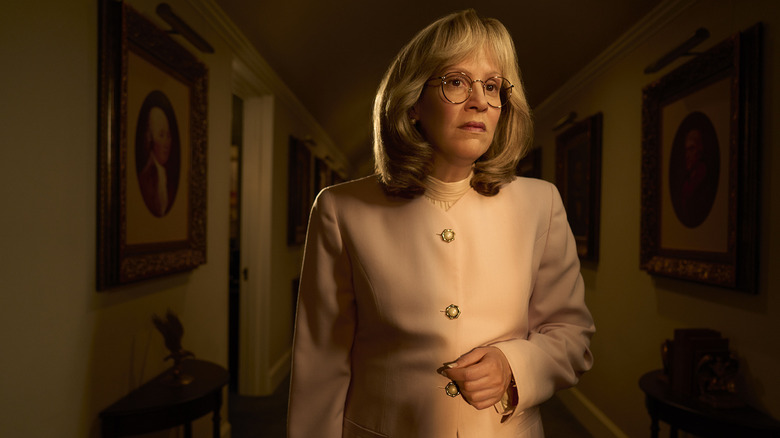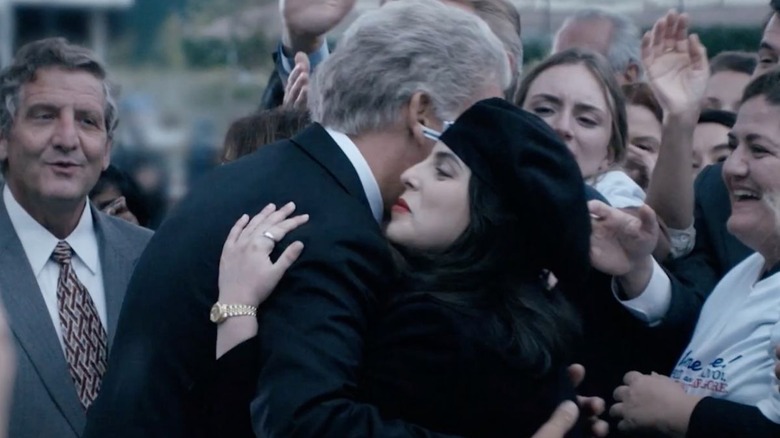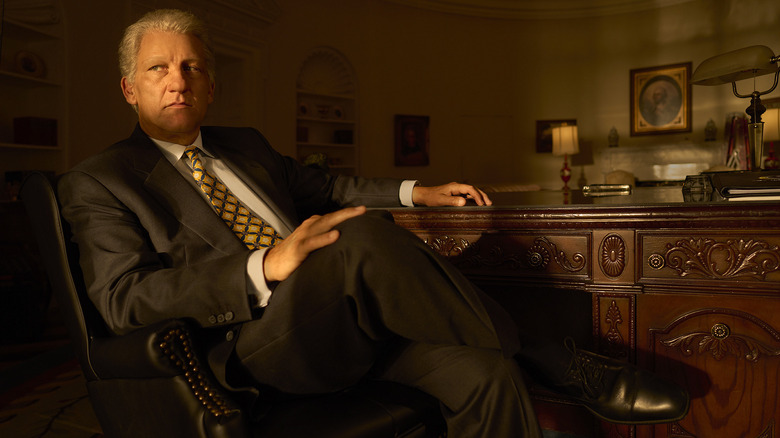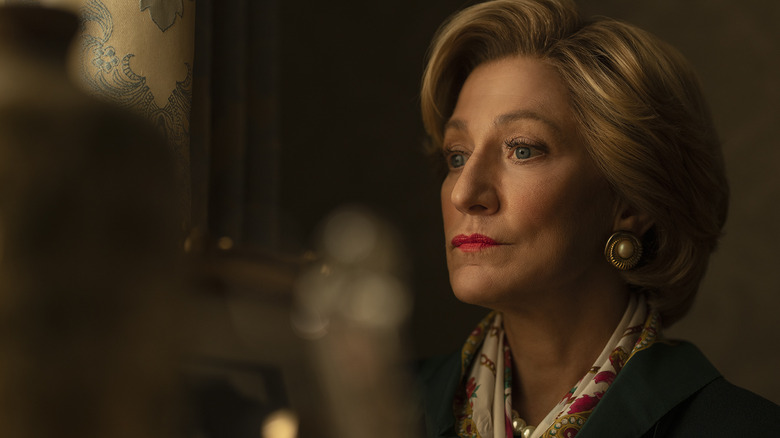
"He's going to have to resign."
That's a sentence multiple people say on different occasions in "Impeachment: American Crime Story," the latest entry in the anthology series that began with "The People vs. O.J. Simpson," and continued with "The Assassination of Gianni Versace." Those previous two seasons dealt with murders as the inciting action, but the deaths in "Impeachment" are metaphorical deaths by a thousand cuts, where people are mercilessly pilloried in the press and the court of public opinion. Here, we travel back to the 1990s and witness the Bill Clinton-Monica Lewinsky scandal -- a scandal that nearly everyone on the show thinks will lead to Bill Clinton becoming the second President of the United States to step down. Of course, everyone knows now that's not what happened. Clinton was able to cling on to power and now enjoys the life of an elder statesman. When the scandal broke, the Clinton White House spun it as a "vast right-wing conspiracy." And indeed, there were plenty of right-leaning creeps gunning to bring Clinton down. But while some of this reasoning wasn't pure, "Impeachment" still makes a good case against Clinton and company. But in the grand scheme of things, Clinton got away mostly unscathed. The same can't be said for Monica Lewinsky.
Sympathy (Or Lack Thereof)

If you lived during the Clinton scandal you'll no doubt recall how merciless virtually everyone was regarding Lewinsky. The left thought she was a liar, or a stalker, or worse; and those on the right who wanted Clinton gone were fine destroying this young woman in the process. All these years later, even in the wake of the #MeToo movement, it feels like no one has truly reckoned with their actions towards Lewinsky during this era. When the scandal breaks in "Impeachment" we're treated to a soul-crushing sequence where Monica, played by Beanie Feldstein, sits in the dark, glued to a TV screen, watching as people like Jay Leno and David Letterman lob cruel jokes in her direction. Surely folks noticed how nasty this was at the time, right?
Lewinsky is at the center of the show, and Feldstein's performance is tragic, sympathetic, and a little maddening. In retrospect, we can see the foolishness in some of Lewinsky's actions, but we can't judge her too harshly. Everyone else already did that. To the credit of "Impeachment," the showrunners brought in the real Lewinsky to advise, ensuring that they were being as respectful as possible to her character. That's not to say the show paints Lewinsky as some blameless saint who didn't know what she was doing -- she's very flawed, and it's commendable, and even brave, that the real Lewinsky signed off on such a portrayal. The first season of "American Crime Story" managed to find sympathy for prosecutor Marcia Clark, another female figure mercilessly targeted by the tabloid-hungry media. Here it's Lewinsky's turn.
But the same can't be said for Linda Tripp, played by frequent Ryan Murphy player Sarah Paulson (who played Clark in "The People vs. O.J. Simpson"). Like Lewinsky, Tripp was mocked by the media, to the point where "Saturday Night Live" slapped a wig and a dress on John Goodman to mock Tripp in a cold open. But while "Impeachment" has room in its heart for Lewinsky, it's a lot harder to empathize with Tripp. The real Tripp is dead -- she died in 2020 -- so she'll be unable to weigh in on her portrayal here, and that might rub some folks the wrong way. Nearly unrecognizable under heavy make-up, Paulson plays Tripp as a raging narcissist bordering on being completely delusional. She's spent her entire life working low-level-ish jobs in D.C., including working at the White House, and this has inflated her self-worth to cataclysmic levels. She hates the Clintons and when she sees a chance to possibly destroy them, she jumps on it. Tripp claims over and over again that she's doing all of this out of a sense of patriotic duty, but she also gets giddy at the idea of being thought of as some kind of hero. Paulson does her best to find some sort of humanity lurking within Tripp, but the character is so often obnoxious that she becomes downright loathsome.
Fate, or chance, brings Tripp and Lewinsky together, with the two of them landing jobs at the Pentagon and becoming friends in the process. But Linda's new friend has a big secret: she's the president's girlfriend.
Blood In The Water

A good friend might keep such info secret, but Tripp's first reaction is to find a way to get this news out there and enrich herself in the process. Under advice from an uncouth literary agent (played by a delightfully droll Margo Martindale), Linda begins secretly recording her phone conversations with Lewinsky. The conversations are long, and gossipy, and even kind of boring. They're not overly salacious, but it doesn't matter. The proof that Bill Clinton is having an affair is big enough -- although, as we see, not entirely unexpected. Clinton's past incidents of alleged sexual harassment also play a part here as we spend time with Paula Jones (Annaleigh Ashford), another Clinton accuser who gets swept up in the media whirlwind. Jones is portrayed as even more naive than Lewinsky, and it's often incredibly uncomfortable to watch her pulled in multiple directions by people who clearly don't have her best interests at heart. But it's Tripp who takes center stage for most of the show's early episodes, and we spend large amounts of time watching her struggle for importance. A late episode does finally manage to drum up some sympathy for her, specifically after Tripp and her kids watch the John Goodman "SNL" skit, but Tripp's ego and self-righteousness are very hard to look past.
In the midst of all this, the right smells blood in the water. Special Prosecutor Ken Star (who is played by Dan Bakkedahl as the world's biggest nerd) and his team are already in the midst of trying to impeach the president over other claims, but eventually, they catch wind of the Clinton-Lewinsky story. The president having an affair isn't enough for impeachment, but when it's discovered that Clinton friend Vernon Jordan (Blair Underwood) used his influence to land Lewinsky a post-D.C. job at Revlon, everyone is on red alert. This could be it, they realize. This could be all they need to bring Clinton down. The right-wing punditry learns all of this as well, and they're practically giddy. While "Impeachment" is very much not pro-Clinton, it's not supporting those trying to stop him, either. Blogger Matt Drudge, played by a fedora-sporting Billy Eichner, and pundit/horrible person Ann Coulter (Cobie Smulders, nailing Coulter's dreary voice) both dig their claws into the story, and neither of them comes off very well. You could argue that Eichner and Smulders' performances are terribly unsubtle, but they're not exactly playing subtle people.
And what of the Clintons? Where do they figure into all of this?
"Is There Something You Need To Tell Me?"

In the early planning stages for "Impeachment," there was talk of keeping Bill Clinton completely off-screen and letting his presence be felt in other ways. This idea was eventually nixed, and now we have Clive Owen sporting a W.C. Fields prosthetic nose to play America's 42nd president. Owen might not seem like obvious casting for Clinton, but he does quite well with the part. His accent is a little wobbly, but Owen is quite good at projecting Clinton's charm -- a charm that can turn to red-hot anger. Clinton isn't portrayed as some sinister figure here, but he's clearly a manipulative, unscrupulous man who can look you right in the eye and lie his ass off. We can believe he has some sort of feelings for Monica in some of their scenes together, but we can also believe he'll be willing to destroy her if it means saving his own skin.
And then there's the other half of the Clinton team, Hillary. The former First Lady is curiously absent for most of the episodes made available to press. While that might make sense -- this isn't Hillary's story, after all -- it is odd that the show went through the trouble of casting the great Edie Falco only to give her nothing to do. I'm assuming Mrs. Clinton has a bigger role to play in later episodes not available to screen yet, but she's primarily a background player here who doesn't get much to say until episode 7. It's at that point that news of the Clinton-Lewinsky affair breaks, and it's telling that the first person the president turns to for guidance is Hillary. Clinton tells his wife that this is all obviously a smear campaign, and Hillary instantly believes him -- whether she genuinely believes him or just says she does out of necessity is up to interpretation, and Falco works wonders with her eyes. We don't know exactly what Hillary is thinking at this moment, and that gives the scene a unique, complicated power. Adding to the atmosphere is the fact that this conversation takes place in the Clinton bedroom, a place that's always cast in a cold white light, as if the room is an icy chamber.
"Is there something you need to tell me?" Hillary pointedly, and knowingly, asks when she learns the news. Bill says no. Does she truly believe him? Perhaps it doesn't matter. All that matters is staying in power. And, of course, that's what happened. To watch the characters here all assume the scandal will bring down Clinton in retrospect is a tad chilling. Clinton's resignation feels like a foregone conclusion to nearly everyone here, but in the end, he survived, and it's hard not to look at the political landscape these days and wonder, "What if?" What if Clinton had stepped down, elevating Al Gore to President? Would it spell the end for the Democratic party, or would it be the beginning of a whole new world? Would the future be completely rewritten? We'll never know, and that's more than a little disconcerting.
Overdue

Time is fluid in "Impeachment," and the non-linear narrative grows a tad tiresome. "The People vs. O.J. Simpson" unfolded by having each episode devoted specifically to a unique member of its big cast. "The Assassination of Gianna Versace" moved backward, like Christopher Nolan's "Memento." "Impeachment" tries neither option. Yes, it jumps around to different characters, but not nearly as deliberately as "O.J." Instead, we careen from one person to the next and then back again. It's snappy, entertaining stuff, but it often feels too breezy. You want everyone to slow down for a moment and consider the weight of everything going on here.
The series also wants to remind you of how dated everything from the '90s seems now, and there are multiple amusing instances where things like the AOL "You've Got Mail!" notification are played for laughs. Then there are groan-inducing stabs at comedy, such as a scene where we meet a young Brett Kavanaugh working on Ken Star's team, and we hear him say, "Well, you know I don't like to take no for an answer!" These unnecessary and clumsy stabs at knowing humor almost never work, and "Impeachment" would've been wise to kick them to the curb.
As regretful as these stumbles may be, they're not enough to sink "Impeachment," and it's mighty impressive that a story where we already know the end can remain so addictive. Parts sympathetic and salacious, "Impeachment" won't change anyone's mind one way or another regarding Bill Clinton -- it's far too late for that -- but it might make some finally find a modicum of sympathy and empathy for Monica Lewinsky, and perhaps that's enough. It's certainly overdue.
Read this next: Impeachment: American Crime Story: Release Date, Cast And More
The post Impeachment Review: American Crime Story Turns the Clinton-Lewinsky Scandal Into Addictive, Uncomfortable TV appeared first on /Film.
0 Comments